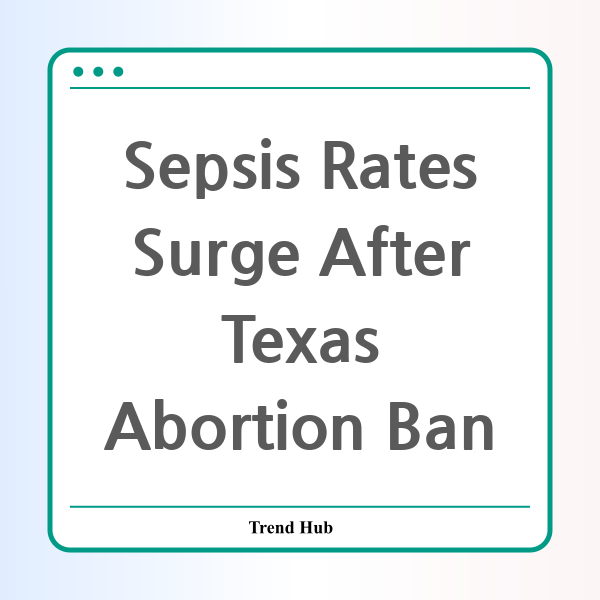* This website participates in the Amazon Affiliate Program and earns from qualifying purchases.

Have you ever considered the impact of legislation on health outcomes? The recent findings on sepsis rates among pregnant women in Texas raise significant alarm bells about maternal health after the state implemented its controversial abortion ban. This blog post dives deep into the consequences of the ban, particularly how it correlates with rising sepsis rates and increased maternal mortality.
The abortion ban enacted in Texas has triggered a concerning trend illustrated by a first-of-its-kind analysis, revealing that the rate of sepsis—a critical infection that can lead to severe health complications—has surged dramatically among pregnant and postpartum women. ProPublica’s detailed examination of hospital discharge data covering several years indicates a more than 50% increase in sepsis cases specifically for women hospitalized following the loss of their pregnancies in the second trimester.
This spike in sepsis is troubling, especially since it predominantly affects women who presented at hospitals with pregnancies that may still have viable heartbeats. The tragic stories of women who developed life-threatening infections after experiencing miscarriages underscore this issue. In some cases, because of the state-imposed abortion restrictions, doctors delayed necessary medical interventions, which would have been performed to ensure the woman’s health if not for concerns about the legal implications of an abortion.
The analysis identified at least 120 in-hospital deaths of pregnant or postpartum women in Texas for the years 2022 and 2023, a worrying increase compared to pre-pandemic conditions. As maternal mortality rates fell across the nation, Texas witnessed a staggering 33% rise during the same period, raising essential questions about the efficacy and safety of current health policies in the state.
Maternal health experts have pointed to the abortion ban as the primary factor surrounding this distressing trend. With the law prohibiting the review of cases involving abortion medications or procedures, healthcare professionals are increasingly at a loss as to how to appropriately care for women facing severe complications without the fear of legal repercussions. The current landscape creates an atmosphere where timely and necessary medical care may be withheld, placing many lives at risk.
Moving forward, even amid mounting concerns and public outcry, Texas legislators appear reluctant to adequately address the ramifications of the abortion ban. While some state officials have suggested a review of the law, substantial changes remain uncertain. The implications of these findings extend beyond Texas, potentially foreshadowing similar outcomes in other states with analogous restrictions.
Healthcare providers have advocated for clearing the fog of legal uncertainty, pushing for the ability to deliver standard care options—including the possibility of termination for health considerations—without fear of prosecution. As the maternal mortality review committee in Texas opts to skip over critical years in the timeline of maternal health outcomes, the state’s approach to addressing this crisis remains questionable.
In conclusion, the surge in sepsis rates following Texas's abortion ban serves as a warning sign of the potential dangers of restrictive reproductive health laws. As lawmakers and healthcare providers grapple with these challenges, it becomes increasingly important to focus on evidence-based approaches to maternal care, ensuring that women receive the treatment they deserve without undue delays or complications due to legal barriers.
* This website participates in the Amazon Affiliate Program and earns from qualifying purchases.